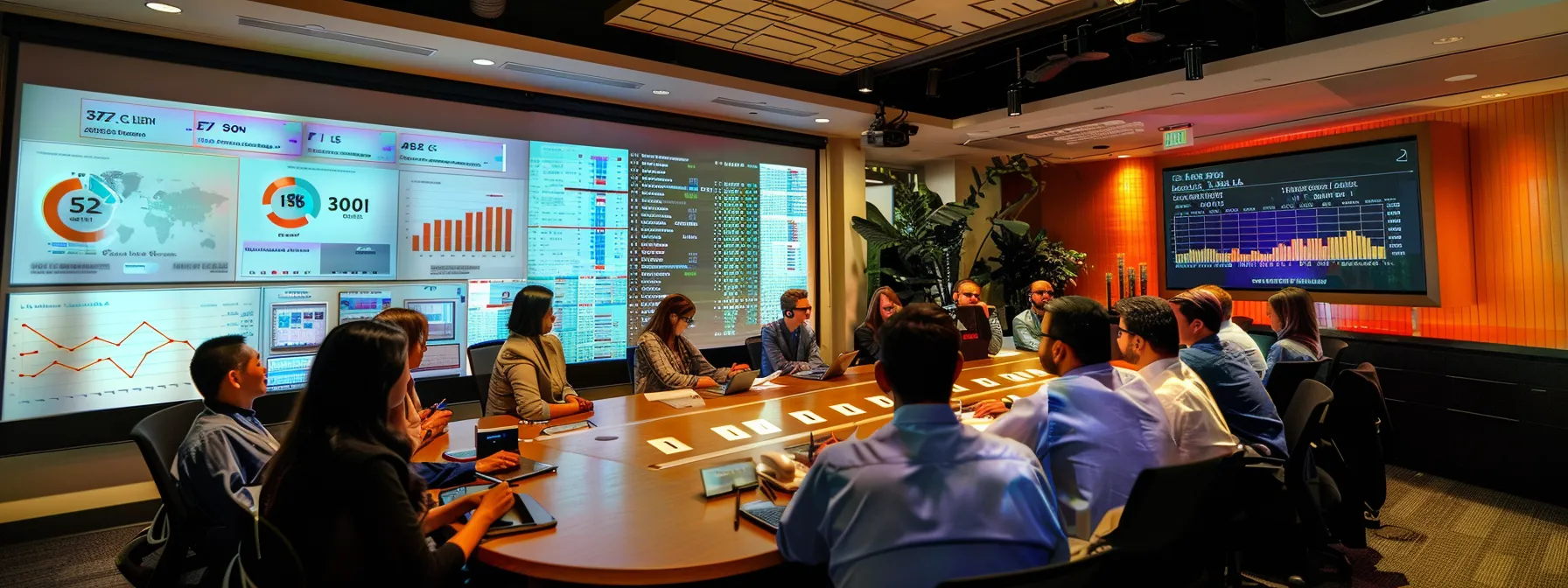The Future of Advisor Independence at LPL Compared to Commonwealth
Does advisor independence at LPL truly offer more value than at Commonwealth? This post lays out key differences between the two, examining trends in independence, compensation models, and technology support. It also highlights how compliance and growth opportunities impact independent advisors. Financial advisors facing limited operational support will gain insights to improve their advisory career. The article provides clear comparisons using straightforward data that address common concerns for professionals striving for a better advisor experience.
Key Takeaways
- lpl and commonwealth support advisors with modern tech and clear compliance platforms
- advisors benefit from structured training and integrated operational tools
- compensation models and fee structures boost advisor satisfaction and performance
- focused networking and mentorship programs strengthen community support
- tailored growth initiatives align advisor strategies with sustainable practice outcomes
Assessing Advisor Independence Trends at LPL and Commonwealth

This section reviews key factors impacting advisor independence today, outlining methods for growing advisor autonomy at LPL and comparing support systems at LPL and Commonwealth. It covers independent broker strategies, strategic management practices, artificial intelligence applications, safe harbor policies, and wealth case studies, while highlighting advisor feedback and industry shifts influencing independence experiences.
Identify Key Factors Impacting Advisor Independence Today
Key factors affecting advisor autonomy today include the balance between fee structures and shareholder interests, where advisors from both LPL and Commonwealth face unique challenges in meeting individual and industry requirements. The role of the financial industry regulatory authority, alongside trends in insurance and investment management, influences the degree of independence advisors experience as they seek practical strategies to adapt to new market conditions.
Explore Strategies for Growing Advisor Autonomy at LPL
The firm employs a structured approach to ensure advisors gain greater autonomy at LPL by offering practical options and clear information that align with individual wealth management goals, similar to leading practices seen at morgan stanley and using private placement opportunities to diversify revenue sources:
- Implement training sessions on emerging technologies.
- Provide platforms that simplify client management.
- Offer benchmarking data to compare performance.
Compare Advisor Support Systems at LPL and Commonwealth
The support systems at LPL and Commonwealth differ in their approach to optimizing advisor operations, with LPL providing integrated platforms that address both private equity investments and asset management needs, while Commonwealth emphasizes streamlined employment support and digital tools such as uagria.online. This focus on technology-driven solutions also includes innovative funding methods like crowdfunding for strategic growth initiatives, illustrating distinct pathways for advisors seeking increased independence. The contrasting approaches offer practical examples for advisors aiming to balance risk and reward in a dynamic market environment.
Examine Advisor Feedback on Independence Experiences
Advisor feedback signals a clear demand for improved contract options and tax-efficient strategies, with many financial advisors noting that a stronger brand presence could enhance their influence, as highlighted by comments from various chief executive officer-led initiatives. This feedback underlines the need for ongoing dialogue between advisors and management to develop methods that better support independence, practical solutions, and competitive compensation structures.
Review Recent Industry Shifts Influencing Independence
The evolving financial sector has witnessed significant industry shifts affecting advisor independence, with changing liability frameworks and increased interest in mutual fund strategies driving new strategic considerations. Advisors benefit from clear due diligence in areas such as venture capital investments and mutual fund selections, enhancing operational clarity and creating a robust support system for informed decision-making:
This climate urges advisors to adapt swiftly, utilizing practical insights to reinforce their independence and effectively address market demands.
Analyze Case Studies of Successful Independent Advisors
Case studies highlight how successful independent advisors integrate cryptocurrency offerings into their wealth strategies while blending ameriprise financial insights with data from initial coin offering metrics, supporting a robust pro forma risk management process:
Evaluating Compensation Models for Independent Advisors

Understanding various fee structures offered at LPL and comparing Commonwealth’s compensation trends provides a clear view of securities, estate planning, regulation a, and regulatory compliance. The review covers advisor preferences, trends in earnings at this privately held company, and performance-based incentives to assess overall advisor satisfaction.
Understand Various Compensation Structures Offered by LPL
LPL offers a variety of compensation structures designed to foster advisor autonomy while providing clear ownership benefits and security, emphasizing compliance with the Securities Exchange Act of 1934 and guidelines set by the sec. The firm strategically structures its subsidiary partnerships to ensure financial stability and transparent fee arrangements, addressing the challenges and needs of independent advisors in today’s market.
Explore How Commonwealth’s Compensation Compares to LPL
Comparing Commonwealth’s compensation to LPL reveals distinct differences that impact how each organization supports its brokers, using robust data to tailor fee structures while addressing diverse regulatory expectations. Commonwealth places emphasis on performance-based incentives, contrasting with LPL’s more stable, structured approach; this mix of strategies mirrors trends seen in raymond james financial, ensuring advisors receive a competitive package that aligns with current market demands.
Assess the Impact of Compensation on Advisor Satisfaction
Advisor satisfaction is notably influenced by how compensation models structure benefits such as asset management, credit allowances, and cash incentives; this impact is visible when firms like UBS and Cetera Financial Group offer competitive packages that address advisors’ core needs, resulting in improved performance and retention. Here is a summary of key points:
- Competitive asset-based arrangements enhance trust.
- Credit and cash incentives drive efficient client management.
- Transparent structures, similar to UBS and Cetera Financial Group, contribute to higher advisor satisfaction.
Examine Advisor Preferences Regarding Fee Structures
Advisors at LPL financial and Commonwealth value fee structures that offer balanced components, including robust osiac frameworks and well-integrated life insurance options, to improve client service and enable proactive financial planning. They report a preference for fee configurations that enhance transparency, sustainability, and operational efficiency, as evidenced by these key characteristics:
- Clear, recurring revenue models
- Integrated elements supporting client service enhancements
- Adaptable strategies that enable ongoing advisor independence
Review Trends in Advisor Earnings Within Both Firms
Advisor earnings at both firms reflect a blend of smart investment strategies empowered by technology and sound revenue management, reinforcing a solid value proposition for financial professionals. The registered investment adviser model at each firm has shaped advisor compensation through distinct performance-based structures that address their ongoing needs and preferences:
- Stable recurring revenue models
- Performance-based payment incentives
- Transparent fee frameworks
Investigate Performance-Based Incentives for Advisors
The evaluation of performance-based incentives demonstrates a robust business model that supports advisor independence, aligning with the Securities Act of 1933 and reflecting elements of a family office approach, which aids both corporations in optimizing equity performance while addressing common challenges faced by financial professionals:
- Structured bonus systems tied to measurable performance
- Incentives that focus on building recurring revenue streams
- Opportunities to align personal and corporate growth strategies
This structured approach offers practical insights and clear benchmarks for advisors striving for optimal compensation and independence.
Investigating Technology and Resources for Advisors
The section covers essential tools, compares offerings at LPL and Commonwealth, reviews user feedback, and explores tech that empowers operations and client management. It also analyzes ongoing updates supporting regulatory compliance, Nasdaq practices, limited liability company structures, assets under management, and crown capital dynamics for independent advisors.
Identify Essential Technological Tools for Independent Advisors
Modern technology equips independent advisors with real-time platforms that simplify customer relationship management, monitor stock movements, and provide expense tracking, all while aligning with current law requirements. Professionals at LPL and Commonwealth implement systems similar to those used by goldman sachs, allowing them to streamline operations and focus on practical solutions that meet client needs effectively. This approach supports advisors in managing regulatory challenges and capitalizing on market opportunities with clarity and efficiency.
Compare LPL and Commonwealth’s Tech Offerings for Advisors
The technology offerings at LPL and Commonwealth reflect distinct strategies that address the practical needs of financial professionals, with tools designed to facilitate smoother operations for tasks such as lawyer consultations, policy reviews, and mergers and acquisitions management. These solutions support advisors by providing efficient platforms that integrate critical business functions and ensure improved operational clarity:
- Integrated client management systems
- Real-time data and compliance support
- Customizable dashboards for transaction tracking
Review User Feedback on Technology Usability and Access
Advisor feedback emphasizes that user-friendly platforms at both LPL and Commonwealth streamline access to essential data and simplify daily operations. Professionals note that these tools improve client interactions and regulatory management while providing clear benchmarks for enhancing overall efficiency. This input drives continual tech improvements, ensuring that systems evolve to meet evolving operational demands and practical insights.
Explore How Technology Empowers Advisors’ Operations
Technology supports advisors at LPL and Commonwealth by streamlining client data management and providing user-friendly tools for monitoring market trends and regulatory updates. This efficient integration empowers financial professionals to manage operations seamlessly while focusing on tailored client strategies and sustainable growth.
Analyze How Tech Influences Client Relationship Management
Technology simplifies client relationship management by providing intuitive platforms that allow advisors at both LPL and Commonwealth to view comprehensive client data in real time. This clear insight helps advisors offer personalized solutions and build stronger client connections, demonstrating a forward-thinking approach to financial advisory. The efficient use of these digital tools reinforces a reliable service model that addresses the critical needs of financial professionals seeking sustained independence.
Evaluate Ongoing Tech Updates and Support for Advisors
The firm continuously refines its tech platform to meet evolving advisor needs, offering regular updates that streamline client data management and regulatory oversight while maintaining robust support channels. A practical example shows that these technological improvements significantly enhance user experience, providing clear benchmarks for performance and operational efficiency:
Analyzing Compliance and Regulatory Support for Advisors
This section examines compliance requirements for independent advisors, comparing LPL’s support with Commonwealth’s approach. It outlines the challenges advisors face in meeting regulations, reviews available resources to streamline compliance efforts, highlights key regulatory trends, and analyzes case scenarios on successful management practices. The insights provide a clear view of regulatory support’s role in advisor independence.
Understand Compliance Requirements for Independent Advisors
Independent advisors face defined compliance protocols that require a proactive approach to regulatory support, with both LPL and Commonwealth offering systems to ensure adherence to evolving financial laws. This setup allows advisors to manage client portfolios with enhanced transparency while addressing regulatory challenges directly through integrated platforms and clear operational guidelines.
Compare LPL’s Compliance Support With That of Commonwealth
LPL provides robust, integrated compliance solutions that simplify regulatory adherence while offering real-time support for advisors, whereas Commonwealth focuses on a streamlined system that emphasizes user-friendly access and consistent updates, ensuring practical compliance management for independent financial professionals:
Assess Challenges Advisors Face in Compliance Procedures
Advisors at both LPL and Commonwealth struggle with rigid guidelines and prolonged review cycles that reduce their operational efficiency and hinder advisor independence:
Examine Resources Available to Streamline Compliance Efforts
Resources available to streamline compliance efforts include integrated digital platforms and specialized audit tools that simplify regulatory monitoring and support advisors at both LPL and Commonwealth. Financial professionals benefit from these systems, as they reduce administrative burdens and allow advisors to focus on client service and effective wealth management strategies.
Review Key Regulatory Trends Impacting Advisor Independence
The evolving regulatory landscape significantly impacts advisor independence with adjustments to liability frameworks, updates to compliance guidelines, and shifts in due diligence requirements driving practical changes; these trends guide advisors at LPL and Commonwealth to adopt more transparent, efficient practices that address operational needs and support sustained growth:
- Adjustments to liability frameworks
- Updates to compliance guidelines
- Shifts in due diligence requirements
Analyze Case Scenarios on Compliance Management Success
Independent financial professionals at both LPL and Commonwealth have recorded notable achievements by utilizing targeted compliance management strategies that minimize administrative delays while maintaining rigorous oversight. Detailed case studies reveal that advisors who adopt streamlined digital compliance tools secure faster regulatory responses, reinforcing operational clarity and strengthening their ability to serve clients effectively.
Exploring Growth Opportunities for Independent Advisors
Independent advisors can expand by targeting niche markets and leveraging unique growth initiatives at both LPL and Commonwealth. Networking resources and training programs further boost advisor capabilities.
Collaboration opportunities and proven strategies from top advisors provide practical insights to support ongoing independence and success in today’s advisory landscape.
Identify Niche Markets for Expanding Advisory Services
Independent advisor growth at LPL compared to Commonwealth benefits from targeting emerging niche markets such as niche family offices, small business wealth management, and specialized asset protection. These focus areas enable advisors to cater to underserved client segments while building focused revenue streams and reinforcing their independence within a competitive environment:
Compare LPL and Commonwealth’s Growth Initiatives
LPL and Commonwealth pursue distinct growth initiatives that help independent advisors advance their practice while addressing unique market dynamics. LPL focuses on providing comprehensive operational tools and robust wealth management solutions to support a broader client base, whereas Commonwealth emphasizes streamlined digital platforms and tailored networking opportunities designed to boost advisor autonomy and foster targeted market expansion. This approach equips advisors with practical methods to enhance their service delivery and build sustained revenue streams.
Assess Networking Resources for Independent Advisors
Independent advisors benefit from extensive networking resources that streamline connections and provide practical support to grow their practices. LPL and Commonwealth deliver digital platforms, virtual events, and interactive seminars that empower advisors to build a robust professional network and access actionable strategies for success:
Review Training Programs Enhancing Advisor Capabilities
The training programs at LPL and Commonwealth are crafted to refine advisors’ expertise, providing hands-on sessions that address real-world challenges and modern compliance practices. These programs emphasize practical, actionable insights to meet today’s regulatory and market demands, offering a structured curriculum that includes:
- Interactive seminars on current market trends
- Workshops focused on regulatory compliance techniques
- Sessions dedicated to technology integration in client management
Explore Collaboration Opportunities With Other Advisors
Independent advisors can benefit from building relationships with peers to share insights and practical strategies that enhance their practice. Peer collaboration has proven effective in addressing operational challenges and identifying growth opportunities, ultimately empowering advisors to increase their independence and performance.
Analyze Successful Growth Strategies From Top Advisors
Top advisors at LPL and Commonwealth implement growth strategies that focus on streamlining operations and refining client engagement, using practical metrics to guide their progress. They address common challenges with clear, actionable insights and prioritize efficient practices to drive successful outcomes in an evolving market environment:
Understanding the Advisor Experience at LPL and Commonwealth
Gather testimonials from advisors at both firms and compare work-life balance scenarios is central to this review. The content assesses organizational culture, retention rates, mentorship opportunities, and the role of community in shaping advisor experiences at LPL and Commonwealth, providing practical insights for prospective advisors.
Gather Testimonials From Advisors at Both Firms
Advisor testimonials from both LPL and Commonwealth show that clear support systems and modern tech tools significantly improve operational efficiency and independence. Experienced advisors highlight practical benefits such as streamlined client management and tailored compliance support that allow them to focus on delivering value to clients. These insights directly address common challenges and inform prospective advisors about effective strategies for success.
Compare Work-Life Balance Scenarios for Advisors
Independent advisors at LPL benefit from structured operational support and dedicated training sessions that streamline daily tasks, while advisors at Commonwealth enjoy flexible digital platforms and adaptive scheduling tools that foster a dynamic work-life balance:
Assess the Organizational Culture at LPL and Commonwealth
The organizational culture at LPL and Commonwealth reflects a strong commitment to supporting advisor independence through clear communication and practical policies, enabling financial professionals to manage their practices with confidence. Both firms stress the value of modern technology and structured guidance, fostering an environment where advisors can thrive while concentrating on client service and business growth. Their focus on continuous improvement and transparent support is evident through key elements such as:
- Modern compliance support systems
- Structured operational training
- Adaptive digital platforms
Review Retention Rates of Advisors in Both Firms
Analysis of advisor retention at both firms shows that structured support systems and adaptive compensation models play a significant role in maintaining long-term relationships. Experts observe that practical operational support and modern technology platforms contribute to enhanced advisor retention, ensuring a stable, supportive environment.>
Explore Mentorship Opportunities Available for Advisors
Both LPL and Commonwealth provide structured mentorship programs that equip financial professionals with practical guidance and real-world insights, enabling advisors to refine their strategies and achieve greater independence. These initiatives offer access to seasoned experts who share hands-on experience and actionable advice, directly addressing advisors’ needs for continuous professional growth and operational efficiency.
Analyze the Role of Community in Advisor Experiences
Advisors at LPL and Commonwealth benefit from robust community networks that foster knowledge sharing and provide a platform for exchanging practical strategies. The strong sense of community helps advisors address challenges collaboratively and encourages steady progress in achieving financial independence while maintaining high client service standards.
Conclusion
Advisor independence remains a critical priority as firms shape financial professionals’ futures through tailored support systems and innovative technology. LPL and Commonwealth offer distinct approaches that empower advisors to manage client portfolios with clarity and confidence. The evolving market demands drive both firms to refine compensation models and compliance tools, ensuring practical operational efficiency. Ultimately, the future of advisor independence depends on balancing adaptive solutions with strong support frameworks that enhance the advisor experience.


